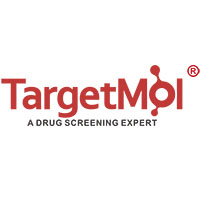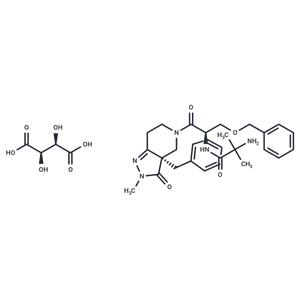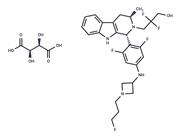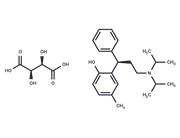| Name | Capromorelin Tartrate |
| Description | Capromorelin Tartrate (CP 424391-18) is a potent, orally active growth hormone secretagogue receptor (GHSR) agonist (Ki: 7 nM for hGHS-R1a). |
| Kinase Assay | Membranes are prepared from HEK293 cells stably transfected with the human GHS-R1a receptor cDNA in the plasmid pcDNA3.1neo. Competition radioligand binding assays are performed in 96-well format with GF/C filters pre-soaked in 0.3% polyethyleneimine. Assays are performed at room temperature for 1 h in duplicate using 50 pM [125I]-ghrelin and 1 μg membrane per well in 50 mM HEPES, pH 7.4, 10 mM MgCl2, 0.2% bovine serum albumin and the following protease inhibitors: 100 μg/mL bacitracin, 100 μg/mL benzamidine, 5 μg/mL aprotinin, 5 μg/mL leupeptin. The membranes are harvested and washed three times with ice-cold ish buffer containing 50 mM HEPES, pH 7.4 and 10 mM MgCl2. IC50 and Ki values are determined using Prism. The Kd of [125I]-ghrelin at membranes expressing human GHS receptors is calculated to be 0.2 nM [1]. |
| Animal Research | The study tested capromorelin flavored oral solution with 30 mg/mL of capromorelin compared to a matched placebo flavored oral solution treatment (which contains all the ingredients of the formulation without capromorelin) administered for 4 days. Dogs are randomized into two groups, with Group 1 receiving placebo (0.1 mL/kg) and Group 2 receiving 3.0 mg/kg. Both groups are treated once a day at approximately 9 AM each day. The first day of dosing is considered Day 0. The placebo and test drug are administered by a syringe placed in the corner of the mouth. The Day 0 weight is used for dose calculations [2]. |
| In vitro | Capromorelin stimulates GH release in rat pituitary cell cultures (EC50: 3 nM) [1]. |
| In vivo | Capromorelin demonstrates enhanced intestinal absorption in rodent models and exhibits superior pharmacokinetic properties, including high bioavailabilities in rats (F=65%) and dogs (F=44%) [1]. It stimulates GH release in anesthetized rats with an ED50 of 0.05 mg/kg iv [1]. In dogs, capromorelin (30 mg/mL) significantly increases food consumption and results in a weight gain of 0.52 kg compared to the placebo group [2]. |
| Storage | Powder: -20°C for 3 years | In solvent: -80°C for 1 year | Shipping with blue ice. |
| Solubility Information | DMSO : 100 mg/mL (152.51 mM)
|
| Keywords | Inhibitor | Growth hormone secretagogue receptor | GHSR | Capromorelin | inhibit | Capromorelin Tartrate |
| Inhibitors Related | Ibutamoren Mesylate | AnaMorelin hydrochloride | YIL 781 | Anamorelin | CJC-1295 acetate(863288-34-0 free base) | hGPR91 antagonist 1 | L-692429 | NF-56-EJ40 hydrochloride | TM-N1324 | Cortistatin-8 acetate |
| Related Compound Libraries | Bioactive Compound Library | Membrane Protein-targeted Compound Library | Anti-Cancer Clinical Compound Library | Drug Repurposing Compound Library | NO PAINS Compound Library | Orally Active Compound Library | Clinical Compound Library | Bioactive Compounds Library Max | GPCR Compound Library | Anti-Cancer Drug Library |

 United States
United States



